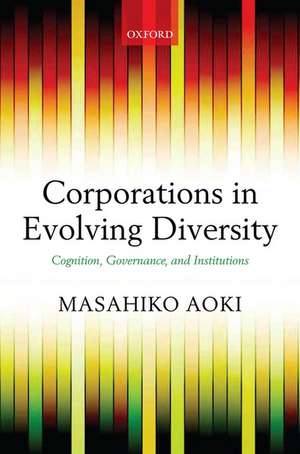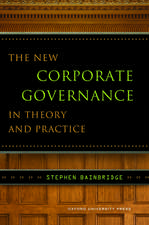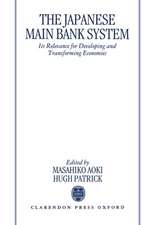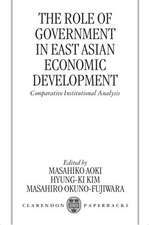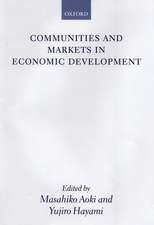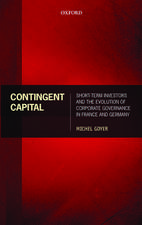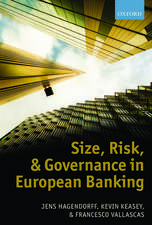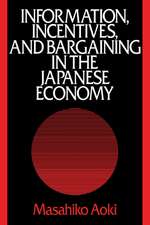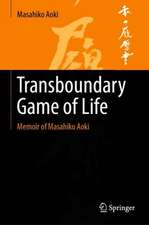Corporations in Evolving Diversity: Cognition, Governance, and Institutions: Clarendon Lectures in Management Studies
Autor Masahiko Aokien Limba Engleză Hardback – 5 mai 2010
| Toate formatele și edițiile | Preț | Express |
|---|---|---|
| Paperback (1) | 153.55 lei 31-37 zile | |
| OUP OXFORD – 3 apr 2019 | 153.55 lei 31-37 zile | |
| Hardback (1) | 388.59 lei 31-37 zile | |
| OUP OXFORD – 5 mai 2010 | 388.59 lei 31-37 zile |
Preț: 388.59 lei
Preț vechi: 477.53 lei
-19% Nou
Puncte Express: 583
Preț estimativ în valută:
74.37€ • 77.35$ • 61.39£
74.37€ • 77.35$ • 61.39£
Carte tipărită la comandă
Livrare economică 02-08 aprilie
Preluare comenzi: 021 569.72.76
Specificații
ISBN-13: 9780199218530
ISBN-10: 0199218536
Pagini: 228
Ilustrații: Illustrations
Dimensiuni: 161 x 240 x 18 mm
Greutate: 0.48 kg
Editura: OUP OXFORD
Colecția OUP Oxford
Seria Clarendon Lectures in Management Studies
Locul publicării:Oxford, United Kingdom
ISBN-10: 0199218536
Pagini: 228
Ilustrații: Illustrations
Dimensiuni: 161 x 240 x 18 mm
Greutate: 0.48 kg
Editura: OUP OXFORD
Colecția OUP Oxford
Seria Clarendon Lectures in Management Studies
Locul publicării:Oxford, United Kingdom
Recenzii
An intriguing read.
Masahiko Aoki uses the social mathematics of game theory to reveal the deep structure of corporate governance systems, in the process explaining the persistence of diversity under conditions of globalization. His profound and highly original analysis speaks directly to the issue of corporate governance reform in the aftermath of the financial crisis of 2008-9.
The recent wave of fraud, corruption, and fiscal irresponsibility at the highest corporate levels dramatizes the need for a model of the modern corporation that is at the same time deeply economic in the recognition of the centrality of incentives, and deeply sociological in the recognition of the centrality of social norms and a culture of corporate morality. Professor Aoki has combined his magisterial knowledge of business organization with a foundational study of the role of culture in epistemic game theory to produce, for the first time, a truly transdisciplinary model of the corporation.
This is a path breaking book that provides a rigorous analysis of the cognitive underpinnings of corporations. It gives fundamental insights into the diversity of organizational forms that exist and the association of these with the historical, political, social, and technological contexts within which they operate. As with so much of Professor Aoki's work, it will radically alter the way in which we view the corporation.
A pioneering contribution which formalizes in game theoretic language complex institutional structure and environment of the corporation both at a moment of time and over time.
Masahiko Aoki uses the social mathematics of game theory to reveal the deep structure of corporate governance systems, in the process explaining the persistence of diversity under conditions of globalization. His profound and highly original analysis speaks directly to the issue of corporate governance reform in the aftermath of the financial crisis of 2008-9.
The recent wave of fraud, corruption, and fiscal irresponsibility at the highest corporate levels dramatizes the need for a model of the modern corporation that is at the same time deeply economic in the recognition of the centrality of incentives, and deeply sociological in the recognition of the centrality of social norms and a culture of corporate morality. Professor Aoki has combined his magisterial knowledge of business organization with a foundational study of the role of culture in epistemic game theory to produce, for the first time, a truly transdisciplinary model of the corporation.
This is a path breaking book that provides a rigorous analysis of the cognitive underpinnings of corporations. It gives fundamental insights into the diversity of organizational forms that exist and the association of these with the historical, political, social, and technological contexts within which they operate. As with so much of Professor Aoki's work, it will radically alter the way in which we view the corporation.
A pioneering contribution which formalizes in game theoretic language complex institutional structure and environment of the corporation both at a moment of time and over time.
Notă biografică
Masahiko Aoki is the Henri and Tomoye Takahashi Professor Emeritus of Japanese Studies in the Economics Department, and Senior Fellow of Stanford Institute of Economic Policy Research (SIEPR) and Freeman Spogli Institute for International Studies (FSI) at Stanford University. He is also the Director of the Virtual Center for Advanced Studies in Institution (VCASI) at Tokyo Foundation. Aoki is currently the President of the International Economic Association (2008-2011). Aoki graduated from the University of Tokyo with a BA and an MA in economics and earned a Ph.D. in economics from the University of Minnesota in 1967. He was formerly an assistant professor at Stanford University and Harvard University and served as both an associate and full professor at the University of Kyoto before re-joining the Stanford faculty in 1984.
